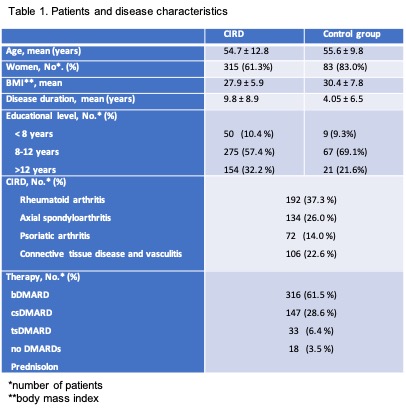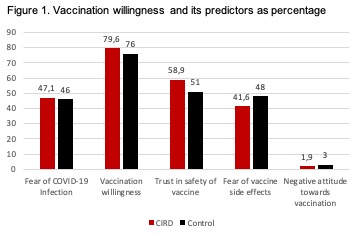Session Information
Date: Saturday, November 6, 2021
Title: Epidemiology & Public Health Poster I: COVID-19 & Vaccination (0084–0117)
Session Type: Poster Session A
Session Time: 8:30AM-10:30AM
Background/Purpose: The SARS-CoV-2 pandemic has affected life in most countries around the world for more than a year now. It is not entirely clear if patients with chronic inflammatory rheumatic diseases (CIRD) are at increased risk for COVID19, but some drugs seem to be associated with worse outcomes. Vaccination has now started but knowledge about patients’ attitudes and acceptance to be vaccinated is limited.
To study the attitudes of patients with CIRD towards the pandemic and their acceptance to be vaccinated against SARS-CoV-2.
Methods: In preparation of this prospective cross-sectional study, a detailed questionnaire was developed. After approval by the ethical committee, patients of our tertiary rheumatology hospital were consecutively included to answer questions regarding the upcoming vaccination against SARS-CoV-2. A numerical rating scale (NRS) ranging from 0 (fully disagree) to 10 (fully agree) was used. A definite positive answer was assumed if ratings were ³ 7. Sociodemographic and comorbidity data, a detailed history of infections, disease characteristics, medication and compliance with hygiene rules were recorded. The data were compared with a control group consisting of patients without CIRD.
Results: A total of 514 CIRD and 100 controls were included (table 1). No significant differences were found in the history of infections or their severity between groups. Recurrent and/or severe infections were reported by 10.5% and 4.5% of CIRD patients vs. 16% and 13% in controls, respectively. A positive PCR test for SARS-CoV-2 was found in 4%-5% of both groups. A larger percentage of CIRD patients felt that they are at increased risk of COVID 19: 60.4% vs. 48.5% in controls (p=0.02), while 47.2% vs. 46.5%, respectively, stated to be afraid of COVID19. Only 63.7% of CIRD patients thought that their medication is ‘immunosuppressive’. About 20% of patients in both groups reported to have experienced COVID 19 associated deaths in their acquaintance. The compliance with hygiene rules was similar with over 90% reporting strict adherence. More CIRD patients reported financial losses due to pandemic: 34% vs. 19%, respectively. Slightly more CIRD patients (79.6%) than controls (76%) were willing to be vaccinated against SARS-CoV-2. About 60% of CIRD patients thought that the vaccines are safe, while 42% were afraid of side effects (figure 1). A generally negative attitude towards vaccination was more often found in controls.
Conclusion: These data indicate that CIRD patients have less severe and recurrent infections than controls but most CIRD patients think that they are at increased risk of a COVID19 infection, but they are less often afraid of being infected. However, CIRD patients have adhered very well to hygiene protection measures, even though their knowledge about their medication seems to be limited. This study also confirms that 80% of CIRD patients are ready to be vaccinated against SARS-CoV-2 even though many admitted fear of side effects. Less than 5% of CIRD patients have been infected with SARS-CoV-2, not much different from the control group. More controls were general opponents of vaccination.
To cite this abstract in AMA style:
Roman I, Andreica I, Baraliakos X, Kiltz U, Braun J. Patients with Chronic Inflammatory Rheumatic Diseases Report a Lower Frequency of Infections Than Controls and They Protect Themselves Well Against SARS-CoV-2 Transmission [abstract]. Arthritis Rheumatol. 2021; 73 (suppl 9). https://acrabstracts.org/abstract/patients-with-chronic-inflammatory-rheumatic-diseases-report-a-lower-frequency-of-infections-than-controls-and-they-protect-themselves-well-against-sars-cov-2-transmission/. Accessed .« Back to ACR Convergence 2021
ACR Meeting Abstracts - https://acrabstracts.org/abstract/patients-with-chronic-inflammatory-rheumatic-diseases-report-a-lower-frequency-of-infections-than-controls-and-they-protect-themselves-well-against-sars-cov-2-transmission/


